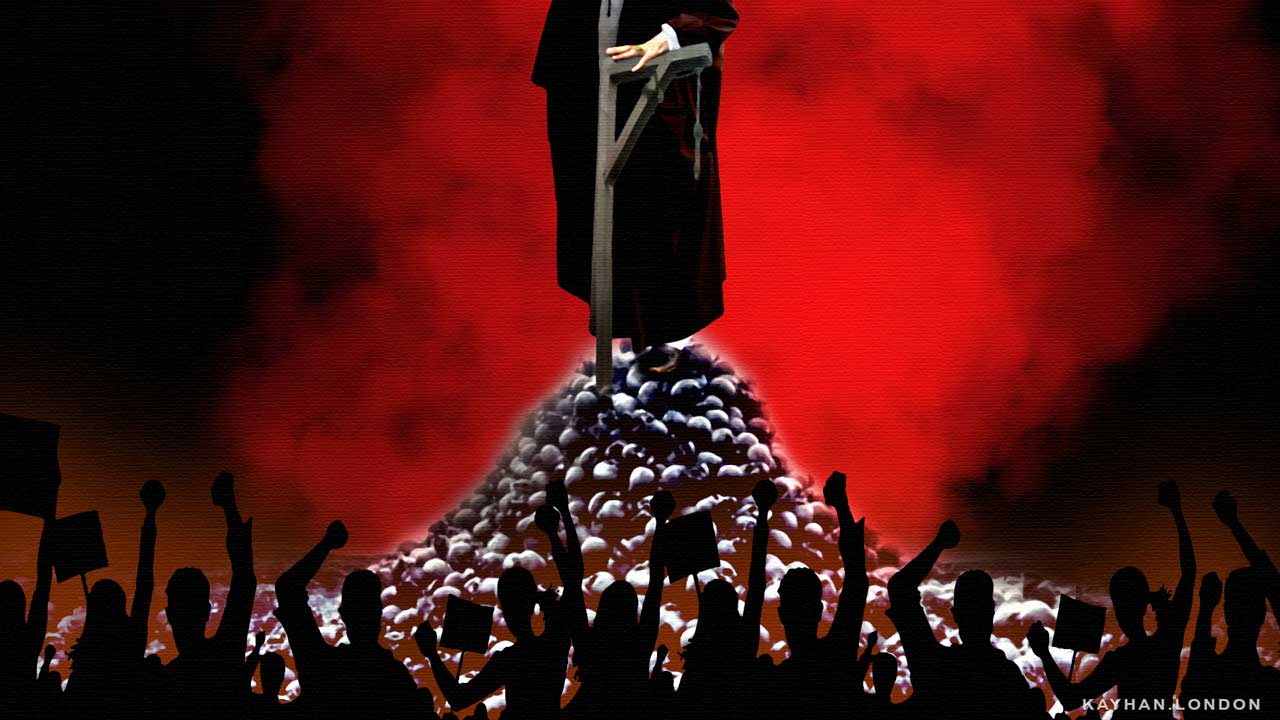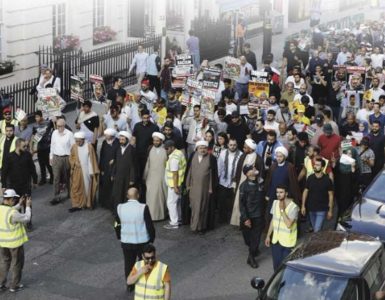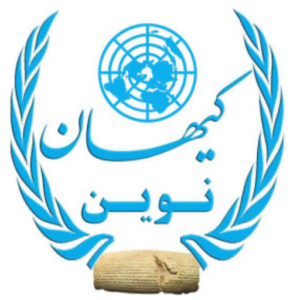رئیس قوه قضاییه جمهوری اسلامی در سخنانی با دفاع از صدور احکام و اجرای احکام «اعدام» معترضانی که در جنبش ملی بازداشت شدند گفته است «او که باید اعدام میشد طبق انصاف اعدام شد یا خواهد شد».
The head of the judiciary of the Islamic Republic, in his speech defending the issuing and execution of the “execution” sentences of the protestors who were arrested in the national movement, said, “He who should have been executed was or will be executed according to justice.”
کیهان نوین: غلامحسین محسنی اژهای از سرکوبهای شهروندان در اعتراضات نیمه دوم سال گذشته دفاع کرده و گفته است «او که باید اعدام میشد طبق انصاف اعدام شد یا خواهد شد.»
– حکم اعدام هفت مرد جوان معترض که در جریان جنبش ملی بازداشت شده بودند طی ماههای گذشته به اجرا درآمد.
– سازمان عفو بینالملل هفته گذشته در گزارشی در مورد خطر اعدام هفت تن دیگر از بازداشتشدگان اعتراضات ۱۴۰۱ هشدار داد.
– بر اساس آمارهای نهادهای حقوق بشری جمهوری اسلامی در سال ۲۰۲۲ میلادی (یازدهم دی ۱۴۰۰ تا دهم دی ۱۴۰۱) دستکم ۵۷۶ نفر را اعدام کرده است.
غلامحسین محسنی اژهای رئیس قوه قضاییه عصر روز سهشنبه ۹ خرداد ۱۴۰۲ در مراسمی در تهران از سرکوبهای شهروندان در اعتراضات نیمه دوم سال گذشته دفاع کرده و گفته که «او که باید اعدام میشد طبق انصاف اعدام شد یا خواهد شد.»
رئیس قوه قضاییه جمهوری اسلامی بار دیگر جنبش ملی و اعتراضات ماههای گذشته را به «دشمن» ارتباط داده و گفته که «دست دشمن در ناهنجاریها در کار است و برای ضربه زدن به اسلام و انقلاب اسلامی این اقدامات را رقم زدهاند این افراد را باید نهادهای امنیتی و اطلاعاتی شناسایی و معرفی کنند.»
او افزوده که «این طیف از افراد به اشد مجازات خواهند رسید. دشمن امروز با لطایفالحیل و جنگ روانی و ابزارهای مختلف میخواهد دو قطبیهایی ایجاد کند و همه افراد را روی به روی هم قرار دهد. البته برخی از این رفتارها سازمان یافته نیستند و قصد ضربه زدن به نظام را ندارند. باید صف آنها را جدا کنیم. باید پس از جدا کردن این صفها؛ اتمام حجت کرد. باید با کارهای فرهنگی به این مسایل رسیدگی کرد.»
غلامحسین محسنی اژهای افزوده که «دشمن خواب براندازی کشور و نظام را دیده بود و همه نوع کمکی کرد تا کشور را به هم بریزد. ولی در کشور دست به دست هم داده شد و دشمن به هدفش نرسید و شکست خورد. صفها جدا شد او که باید اعدام میشد طبق انصاف اعدام شد یا خواهد شد. او که گول و فریب خورده بود هم به طور عادلانه برخورد شد و بسیاری از افراد عفو خوردند.»
رئیس قوه قضاییه جمهوری اسلامی در حالی ادعای «عفو بسیاری از افراد» را مطرح کرده که در هفتههای گذشته شمار زیادی از افرادی که در ارتباط با اعتراض سال گذشته بازداشت شده و در اواخر سال با ادعای «عفو» از سوی قوه قضاییه آزاد شدند، بازداشت شده یا به دادسرا احضار شدند و پروندههای آنها بار دیگر به جریان افتاده است.
از سوی دیگر تأکید و دفاع غلامحسین محسنی اژهای از اعدام شهروندان معترض در حالی قابل توجه است که در روزهای گذشته هشدار درباره خطر اعدام چند شهروند معترض دیگر مطرح شده و در اواخر ماه گذشته نیز حکم اعدام سه معترض در پرونده «خانه اصفهان» اجرا شد.
دفتر حقوق بشر سازمان ملل متحد در ژنو حدود یک ماه پیش اعلام کرد که جمهوری اسلامی در سال جاری میلادی یعنی از یازدهم دی ۱۴۰۱ تا زمان انتشار آن گزارش ۲۰۹ نفر را اعدام کرده که آن را رکوردی «مایه انزجار» خواند.
سخنگوی دفتر حقوق بشر سازمان ملل گفته است که در سال جاری میلادی «بطور متوسط هر هفته بیش از ۱۰ نفر در ایران اعدام شدهاند، که این کشور را به یکی از بالاترین اجراکنندگان حکم اعدام در جهان بدل میکند».
سازمان عفو بینالملل به تازگی اعلام کرده که جمهوری اسلامی در سال ۲۰۲۲ میلادی (یازدهم دی ۱۴۰۰ تا دهم دی ۱۴۰۱) دستکم ۵۷۶ نفر را اعدام کرده است.
عفو بینالملل میگوید آمار اعدامشدگان در ایران در سال ۲۰۲۲ میلادی که حداقل ۵۷۶ نفر بوده در مقایسه با آمار سال ۲۰۲۱ میلادی رشد چشمگیری نشان می دهد. این سازمان تعداد اعدامشدگان سال ۲۰۲۱ میلادی در ایران را حداقل ۳۱۴ نفر اعلام کرده بود.
این گزارش میگوید از ۵۷۶ اعدام شده در سال گذشته میلای، ۲۷۹ نفر به محکوم به قصاص، ۲۵۵ نفر در جرائم مرتبط با مواد مخدر، ۲۱ نفر متهم به تجاوز جنسی و ۱۸ نفر به اتهام «محاربه» به اعدام محکوم شده بودند.
جدا از افزایش شمار اعدامهای متهمان مواد مخدر و قصاص، به نظر میرسد قوه قضاییه به دنبال اجرای احکام اعدام شهروندان معترضی است که در اعتراضات سال گذشته بازداشت و با اتهامات سنگین و غیرواقعی چون «محاربه»، «بغی» و «افساد فی الارض» روبرو شدند.
حکم اعدام هفت مرد جوان معترض که در جریان جنبش ملی بازداشت شده بودند طی ماههای گذشته اجرایی شده است. محسن شکاری ۱۷ آذرماه ۱۴۰۱ نخستین شهروندی بود که در اعتراضات بازداشت و حکم اعدام او در تهران اجرا شد. چند روز بعد در ۲۱ آذرماه ۱۴۰۱ حکم اعدام مجیدرضا رهنورد در مشهد به اجرا درآمد.
محمدمهدی کرمی و محمد(کیان) حسینی نیز در ۲۱ دیماه ۱۴۰۱ در کرج اجرایی شد. مجید کاظمی، صالح میرهاشمی و سعید یعقوبی متهمان پرونده «خانه اصفهان» در ارتباط با کشته شدن دو بسیجی و یک سرهنگ یگان ویژه با اتهام واهی «محاربه» به اعدام محکوم شده بودند روز جمعه ۲۹ اردیبهشت در زندان «دستگرد» اصفهان به دار آویخته شدند.
هفت جوان برومند در حالی به چوبه دار سپرده شدند که بر اساس اطلاعات منابع حقوق بشری و وکلای دادگستری پرونده همه آنها با ابهامات زیادی روبرو بوده است. اعتراف اجباری زیر شکنجه، عدم وجود مستندات لازم و کافی که بیانگر ارتکاب این جوانان به جرم یا اثباتکننده اتهام سنگین «محاربه» باشد، عدم برخورداری از وکلای انتخابی، عدم امکان دفاع در دادگاه از جمله ایرادات حقوقی وارد به روند دادرسی آنها بوده است.
همچنین گزارشها از خطر صدور یا اجرای حکم اعدام شمار دیگری از بازداشتشدگان اعتراضات سال گذشته حکایت دارد.
سازمان عفو بینالملل هفته گذشته در دوم خردادماه نیز در گزارشی در مورد خطر اعدام هفت تن دیگر از بازداشتشدگان اعتراضات ۱۴۰۱ هشدار داد. بر اساس این گزارش ابراهیم نارویی، کامبیز خروت، منوچهر مهماننواز، منصوره دهمرده، محمد قبادلو، مجاهد[عباس] کورکور و شعیب میربلوچزهی ریگی در خطر اعدام قرار دارند.
همچنین سه شهروند معترض نیز در خطر صدور حکم اعدام در پرونده معروف به پرونده «اکباتان» قرار دارند. این پرونده در رابطه با مرگ آرمان علیوردی از اعضای یگان امنیتی بسیج اکباتان تشکیل شد که در اعتراضات مجروح و بعد از دو روز در بیمارستان مُرد.
بنا بر کیفرخواست صادره، میلاد آرمون، محمدمهدی حسینی و مهدی ایمانی سه متهم ردیف اول تا سوم پرونده به «محاربه» متهم، و علیرضا کفایی و حسین نعمتی و یک جوان دیگر نیز به «مشارکت در قتل عمد» و اتهاماتی از جمله «تبلیغ علیه نظام» متهم شدهاند.
هفته گذشته منابع حقوق بشری هشدارهایی درباره احتمال صدور حکم اعدام علیه میلاد آرمون، علیرضا کفایی و مهدی ایمانی دادند. همچنین روز گذشته نام نوید نجاران به عنوان متهم دیگری در این پرونده منتشر شد اما از اتهامات او خبری در دست نیست.
منابع حقوق بشری و تحلیلگران معتقدند اعدام شهروندان معترض که با دست خالی در اعتراضات سال گذشته شرکت داشته و مرتکب هیچ اقدام تروریستی یا جنایتی نشدهاند، با هدف وحشتآفرینی و مهندسی افکار عمومی، و جلوگیری از شروع موج تازهای از اعتراضات صورت گرفته است.
غلامحسین محسنی اژهای رئیس قوه قضائیه جمهوری اسلامی در آبان ماه سال گذشته و پس از بیانیه نمایندگان مجلس شورای اسلامی که خواستار اعدام معترضان شده بودند، با صدور حکم اعدام برای افراد متهم به «محاربه» موافقت کرد.
او همچنین اواخر آذرماه گذشته خواستار واستار اجرای سریع و بدون تأخیر احکام قطعی با رعایت موازین و تشریفات قانونی و خودداری از تأخیر در اجرای احکام از جمله برای محکومین «پروندههای اغتشاشات» شد.
رئیس قوه قضاییه درباره معترضان محکوم به اعدام: آنهایی که باید، اعدام شدند یا میشوند!
– غلامحسین محسنی اژهای از سرکوبهای شهروندان در اعتراضات نیمه دوم سال گذشته دفاع کرده و گفته است «او که باید اعدام میشد طبق انصاف اعدام شد یا خواهد شد.»
– حکم اعدام هفت مرد جوان معترض که در جریان جنبش ملی بازداشت شده بودند طی ماههای گذشته به اجرا درآمد.
– سازمان عفو بینالملل هفته گذشته در گزارشی در مورد خطر اعدام هفت تن دیگر از بازداشتشدگان اعتراضات ۱۴۰۱ هشدار داد.
– بر اساس آمارهای نهادهای حقوق بشری جمهوری اسلامی در سال ۲۰۲۲ میلادی (یازدهم دی ۱۴۰۰ تا دهم دی ۱۴۰۱) دستکم ۵۷۶ نفر را اعدام کرده است.
رئیس قوه قضاییه جمهوری اسلامی در سخنانی با دفاع از صدور احکام و اجرای احکام «اعدام» معترضانی که در جنبش ملی بازداشت شدند گفته است «او که باید اعدام میشد طبق انصاف اعدام شد یا خواهد شد».

غلامحسین محسنی اژهای رئیس قوه قضاییه عصر روز سهشنبه ۹ خرداد ۱۴۰۲ در مراسمی در تهران از سرکوبهای شهروندان در اعتراضات نیمه دوم سال گذشته دفاع کرده و گفته که «او که باید اعدام میشد طبق انصاف اعدام شد یا خواهد شد.»
رئیس قوه قضاییه جمهوری اسلامی بار دیگر جنبش ملی و اعتراضات ماههای گذشته را به «دشمن» ارتباط داده و گفته که «دست دشمن در ناهنجاریها در کار است و برای ضربه زدن به اسلام و انقلاب اسلامی این اقدامات را رقم زدهاند این افراد را باید نهادهای امنیتی و اطلاعاتی شناسایی و معرفی کنند.»
او افزوده که «این طیف از افراد به اشد مجازات خواهند رسید. دشمن امروز با لطایفالحیل و جنگ روانی و ابزارهای مختلف میخواهد دو قطبیهایی ایجاد کند و همه افراد را روی به روی هم قرار دهد. البته برخی از این رفتارها سازمان یافته نیستند و قصد ضربه زدن به نظام را ندارند. باید صف آنها را جدا کنیم. باید پس از جدا کردن این صفها؛ اتمام حجت کرد. باید با کارهای فرهنگی به این مسایل رسیدگی کرد.»
غلامحسین محسنی اژهای افزوده که «دشمن خواب براندازی کشور و نظام را دیده بود و همه نوع کمکی کرد تا کشور را به هم بریزد. ولی در کشور دست به دست هم داده شد و دشمن به هدفش نرسید و شکست خورد. صفها جدا شد او که باید اعدام میشد طبق انصاف اعدام شد یا خواهد شد. او که گول و فریب خورده بود هم به طور عادلانه برخورد شد و بسیاری از افراد عفو خوردند.»
رئیس قوه قضاییه جمهوری اسلامی در حالی ادعای «عفو بسیاری از افراد» را مطرح کرده که در هفتههای گذشته شمار زیادی از افرادی که در ارتباط با اعتراض سال گذشته بازداشت شده و در اواخر سال با ادعای «عفو» از سوی قوه قضاییه آزاد شدند، بازداشت شده یا به دادسرا احضار شدند و پروندههای آنها بار دیگر به جریان افتاده است.
از سوی دیگر تأکید و دفاع غلامحسین محسنی اژهای از اعدام شهروندان معترض در حالی قابل توجه است که در روزهای گذشته هشدار درباره خطر اعدام چند شهروند معترض دیگر مطرح شده و در اواخر ماه گذشته نیز حکم اعدام سه معترض در پرونده «خانه اصفهان» اجرا شد.
دفتر حقوق بشر سازمان ملل متحد در ژنو حدود یک ماه پیش اعلام کرد که جمهوری اسلامی در سال جاری میلادی یعنی از یازدهم دی ۱۴۰۱ تا زمان انتشار آن گزارش ۲۰۹ نفر را اعدام کرده که آن را رکوردی «مایه انزجار» خواند.
سخنگوی دفتر حقوق بشر سازمان ملل گفته است که در سال جاری میلادی «بطور متوسط هر هفته بیش از ۱۰ نفر در ایران اعدام شدهاند، که این کشور را به یکی از بالاترین اجراکنندگان حکم اعدام در جهان بدل میکند».
سازمان عفو بینالملل به تازگی اعلام کرده که جمهوری اسلامی در سال ۲۰۲۲ میلادی (یازدهم دی ۱۴۰۰ تا دهم دی ۱۴۰۱) دستکم ۵۷۶ نفر را اعدام کرده است.
عفو بینالملل میگوید آمار اعدامشدگان در ایران در سال ۲۰۲۲ میلادی که حداقل ۵۷۶ نفر بوده در مقایسه با آمار سال ۲۰۲۱ میلادی رشد چشمگیری نشان می دهد. این سازمان تعداد اعدامشدگان سال ۲۰۲۱ میلادی در ایران را حداقل ۳۱۴ نفر اعلام کرده بود.
این گزارش میگوید از ۵۷۶ اعدام شده در سال گذشته میلای، ۲۷۹ نفر به محکوم به قصاص، ۲۵۵ نفر در جرائم مرتبط با مواد مخدر، ۲۱ نفر متهم به تجاوز جنسی و ۱۸ نفر به اتهام «محاربه» به اعدام محکوم شده بودند.
جدا از افزایش شمار اعدامهای متهمان مواد مخدر و قصاص، به نظر میرسد قوه قضاییه به دنبال اجرای احکام اعدام شهروندان معترضی است که در اعتراضات سال گذشته بازداشت و با اتهامات سنگین و غیرواقعی چون «محاربه»، «بغی» و «افساد فی الارض» روبرو شدند.
حکم اعدام هفت مرد جوان معترض که در جریان جنبش ملی بازداشت شده بودند طی ماههای گذشته اجرایی شده است. محسن شکاری ۱۷ آذرماه ۱۴۰۱ نخستین شهروندی بود که در اعتراضات بازداشت و حکم اعدام او در تهران اجرا شد. چند روز بعد در ۲۱ آذرماه ۱۴۰۱ حکم اعدام مجیدرضا رهنورد در مشهد به اجرا درآمد.
محمدمهدی کرمی و محمد(کیان) حسینی نیز در ۲۱ دیماه ۱۴۰۱ در کرج اجرایی شد. مجید کاظمی، صالح میرهاشمی و سعید یعقوبی متهمان پرونده «خانه اصفهان» در ارتباط با کشته شدن دو بسیجی و یک سرهنگ یگان ویژه با اتهام واهی «محاربه» به اعدام محکوم شده بودند روز جمعه ۲۹ اردیبهشت در زندان «دستگرد» اصفهان به دار آویخته شدند.
هفت جوان برومند در حالی به چوبه دار سپرده شدند که بر اساس اطلاعات منابع حقوق بشری و وکلای دادگستری پرونده همه آنها با ابهامات زیادی روبرو بوده است. اعتراف اجباری زیر شکنجه، عدم وجود مستندات لازم و کافی که بیانگر ارتکاب این جوانان به جرم یا اثباتکننده اتهام سنگین «محاربه» باشد، عدم برخورداری از وکلای انتخابی، عدم امکان دفاع در دادگاه از جمله ایرادات حقوقی وارد به روند دادرسی آنها بوده است.
همچنین گزارشها از خطر صدور یا اجرای حکم اعدام شمار دیگری از بازداشتشدگان اعتراضات سال گذشته حکایت دارد.
سازمان عفو بینالملل هفته گذشته در دوم خردادماه نیز در گزارشی در مورد خطر اعدام هفت تن دیگر از بازداشتشدگان اعتراضات ۱۴۰۱ هشدار داد. بر اساس این گزارش ابراهیم نارویی، کامبیز خروت، منوچهر مهماننواز، منصوره دهمرده، محمد قبادلو، مجاهد[عباس] کورکور و شعیب میربلوچزهی ریگی در خطر اعدام قرار دارند.
همچنین سه شهروند معترض نیز در خطر صدور حکم اعدام در پرونده معروف به پرونده «اکباتان» قرار دارند. این پرونده در رابطه با مرگ آرمان علیوردی از اعضای یگان امنیتی بسیج اکباتان تشکیل شد که در اعتراضات مجروح و بعد از دو روز در بیمارستان مُرد.
بنا بر کیفرخواست صادره، میلاد آرمون، محمدمهدی حسینی و مهدی ایمانی سه متهم ردیف اول تا سوم پرونده به «محاربه» متهم، و علیرضا کفایی و حسین نعمتی و یک جوان دیگر نیز به «مشارکت در قتل عمد» و اتهاماتی از جمله «تبلیغ علیه نظام» متهم شدهاند.
هفته گذشته منابع حقوق بشری هشدارهایی درباره احتمال صدور حکم اعدام علیه میلاد آرمون، علیرضا کفایی و مهدی ایمانی دادند. همچنین روز گذشته نام نوید نجاران به عنوان متهم دیگری در این پرونده منتشر شد اما از اتهامات او خبری در دست نیست.
منابع حقوق بشری و تحلیلگران معتقدند اعدام شهروندان معترض که با دست خالی در اعتراضات سال گذشته شرکت داشته و مرتکب هیچ اقدام تروریستی یا جنایتی نشدهاند، با هدف وحشتآفرینی و مهندسی افکار عمومی، و جلوگیری از شروع موج تازهای از اعتراضات صورت گرفته است.
غلامحسین محسنی اژهای رئیس قوه قضائیه جمهوری اسلامی در آبان ماه سال گذشته و پس از بیانیه نمایندگان مجلس شورای اسلامی که خواستار اعدام معترضان شده بودند، با صدور حکم اعدام برای افراد متهم به «محاربه» موافقت کرد.
او همچنین اواخر آذرماه گذشته خواستار واستار اجرای سریع و بدون تأخیر احکام قطعی با رعایت موازین و تشریفات قانونی و خودداری از تأخیر در اجرای احکام از جمله برای محکومین «پروندههای اغتشاشات» شد.
این در حالیست که اتهامات «محاربه»، «بغی» و «افساد فی الارض» علیه شهروندان و اجرای حکم اعدام آنها حتی بر اساس قوانین جمهوری اسلامی نیز اقدامی غیرقانونی است و تا کنون مخالفتهای زیادی با آن شده است.
محسن برهانی وکیل دادگستری که در حوزه علمیه درس خوانده از جمله منتقدان شدید احکام علیه شهروندان معترض بوده است. او اتهام «محاربه» و صدور احکام «اعدام» علیه معترضان را داری «اشتباه فاحش» خوانده است.
محسن برهانی همچنین صدور احکام اعدام را «غیرشرعی» دانسته است: «در اعتراضات اخیر، کسانی که دست به سلاح بردند، هدفشان ترساندن مأموران امنیتی و انتظامی بود و اتفاقاً به دنبال ایجاد قوت قلب و تشجیع مردم بودند. بنابراین شرایط جرم محاربه محقق نشده است و چنین احکامی محل اشکال است. اعدامهایی غیرشرعی و به قصد ارعاب عمومی!!»
مجمع مدرسین و محققین حوزه علمیه قم نیز سال گذشته با صدور بیانیهای درباره صدور و اجرای حکم اعدام علیه شهروندان معترض نوشته که اجرای حکم اعدام یکی از معترضان، آنهم در شرایطی که اقتضا میکند حکومت با شنیدن صدای اعتراض مردم در راه آرامکردن اوضاع گام بردارد، بخش عظیمی از جامعه به ویژه فرهیختگان و دلسوزان کشور را شگفتزده و وجدان عمومی را جریحهدارتر کرد.
در این بیانیه آمده بود که «صرف نظر از اشکالات فقهی و حقوقی که در روند دادرسی، صدور و اجرای ناگهانی این حکم وجود داشته است، اساساً اعدام راهکاری درست برای تأمین امنیت و کاستن از التهاب نیست؛ زیرا این کار به خشم و کینه جامعه میافزاید و ناآگاهی از فضای افکار عمومی جامعه و بیتوجهی مسئولان امر به مصالح کشور را نشان میدهد. افزون بر این مشکل اصلی این است که روند قضائی این محاکمات نتوانسته است افکار عمومی را قانع کند.»
Gholamhossein Mohseni Ajeei defended the repression of citizens during the protests of the second half of last year and said, “He who should have been executed was or will be executed according to fairness.”
– The death sentence of seven protesting young men who were arrested during the national movement was executed during the past months.
– Amnesty International warned in a report last week about the risk of execution of seven more people detained during the 1401 protests.
– According to the statistics of human rights organizations, the Islamic Republic has executed at least 576 people in 2022 AD (11th December 1400 to 10th December 1401).
Gholamhossein Mohseni Ajeei, head of the judiciary, defended the repression of citizens during the protests of the second half of last year in a ceremony in Tehran on Tuesday evening, June 9, 1402, and said that “he who should have been executed was or will be executed according to fairness.”
The head of the Judiciary of the Islamic Republic once again linked the national movement and the protests of the past months to the “enemy” and said that “the hand of the enemy is involved in the anomalies and they have taken these measures to attack Islam and the Islamic Revolution. Identify and introduce security and information.
He added that “this range of people will be severely punished.” Today’s enemy wants to create bipolarities and pit all people against each other with Lataif Al Hail and psychological warfare and various tools. Of course, some of these behaviors are not organized and do not intend to attack the system. We have to separate them. After separating these queues; Completed the argument. These issues should be addressed with cultural works.
Gholamhossein Mohseni Ajeei added that “the enemy had dreamed of overthrowing the country and the system and he did all kinds of help to destroy the country. But in the country, they joined hands and the enemy did not reach his goal and was defeated. The ranks were separated. He who should have been executed was or will be executed according to justice. “He who was deceived was treated fairly and many people were pardoned.”
The head of the Judiciary of the Islamic Republic has made the claim of “amnesty for many people” while in recent weeks, a large number of people who were arrested in connection with last year’s protest and released at the end of the year with the claim of “amnesty” by the judiciary. They were arrested or summoned to the prosecutor’s office and their cases have been brought up again.
On the other hand, Gholamhossein Mohseni Ejei’s emphasis and defense of the execution of protesting citizens is noteworthy, while in the past days, warnings were raised about the risk of execution of several other protesting citizens, and at the end of last month, the death sentence of three protesters in the “Isfahan House” case was executed. .
The Human Rights Office of the United Nations in Geneva announced about a month ago that the Islamic Republic executed 209 people this year, from January 11, 1401 until the publication of the report, which it called a “disgusting” record.
The spokesperson of the United Nations Human Rights Office said that this year, “on average, more than 10 people have been executed in Iran every week, which makes this country one of the highest executioners in the world.”
Amnesty International recently announced that the Islamic Republic executed at least 576 people in 2022 (11th December 1400 to 10th December 1401).
Amnesty International says that the number of people executed in Iran in 2022, which was at least 576 people, shows a significant growth compared to the number of 2021. This organization had announced the number of executed people in Iran in 2021 at least 314 people.
This report says that out of the 576 people executed last year, 279 were sentenced to death for revenge, 255 for drug-related crimes, 21 for sexual assault, and 18 for “warfare”.
Apart from the increase in the number of executions of those accused of drugs and revenge, it seems that the judiciary is seeking to execute the death sentences of the protesting citizens who were arrested during last year’s protests and charged with serious and unrealistic charges such as “warfare”, “baghi” and “corruption on earth”. They faced
The death sentence of seven protesting young men who were arrested during the national movement has been implemented in the past months. Mohsen Shekari was the first citizen who was arrested during the protests and his death sentence was executed in Tehran on December 17, 1401. A few days later, on December 21, 1401, the death sentence of Majidreza Rahnavard was executed in Mashhad.
Mohammad Mehdi Karmi and Mohammad (Kian) Hosseini also took effect on 21 December 1401 in Karaj. Majid Kazemi, Saleh Mirhashmi and Saeed Yaqoubi, accused in the “Isfahan House” case in connection with the killing of two Basij and a special unit colonel, were sentenced to death on the trumped-up charge of “warfare” and were hanged on Friday, May 29, in Isfahan’s “Dastgerd” prison. became
Seven young men from Broumand were handed over to the gallows while, according to the information of human rights sources and lawyers, their case was facing many uncertainties. Forced confessions under torture, the lack of necessary and sufficient documentation to prove that these young people have committed a crime or to prove the heavy accusation of “warfare”, the lack of selected lawyers, the impossibility of defending themselves in court are among the legal flaws in their proceedings.
Also, the reports indicate the risk of issuing or executing the death sentence for another number of those arrested during last year’s protests.
Last week, on June 2, Amnesty International warned in a report about the risk of execution of seven more people arrested during the 1401 protests. According to this report, Ebrahim Naravi, Kambiz Khorot, Manouchehr Mehmanovaz, Mansoura Dehmardeh, Mohammad Qabadlou, Mujahid [Abbas] Korkur and Shoaib Mirbalochzahi Rigi are in danger of execution.
Also, three protesting citizens are in danger of issuing a death sentence in the case known as “Ekbatan” case. This case was filed in relation to the death of Arman Alivardi, a member of the Basij Ekbatan security unit, who was injured in the protests and died two days later in the hospital.
According to the issued indictment, Milad Armon, Mohammad Mahdi Hosseini and Mehdi Imani, the three defendants in the first to third tier of the case, are accused of “moharebeh”, and Alireza Kafaei, Hossein Nemati and another young man are also accused of “participating in intentional murder” and accusations such as “propaganda” have been accused against the system.
Last week, human rights sources warned about the possibility of death sentence against Milad Armon, Alireza Kefaei and Mehdi Imani. Also, the name of Navid Najaran was published as another accused in this case, but there is no news about his charges.
Human rights sources and analysts believe that the execution of the protesting citizens who participated in last year’s protests with their bare hands and did not commit any terrorist or criminal acts was done with the aim of creating terror and engineering public opinion, and to prevent the start of a new wave of protests.
Gholamhossein Mohseni Ajeei, the head of the Islamic Republic of Judiciary, in November of last year, after the statement of the members of the Islamic Council, who demanded the execution of the protesters, agreed to issue the death sentence for the people accused of “Moharebeh”.
At the end of last December, he also called for the speedy execution of final judgments without delay in compliance with legal standards and formalities, and refraining from delaying the execution of judgments, including for the convicts of “riot cases”.
This is despite the fact that the accusations of “moharebeh”, “baghi” and “corruption on earth” against the citizens and the execution of their death sentence are illegal even according to the laws of the Islamic Republic, and so far there have been many objections to it.
Mohsen Burhani, a lawyer who studied in the seminary, was among the severe critics of the rulings against protesting citizens. He has called the accusation of “warfare” and the issuing of “death sentences” against the protesters as “gross mistakes”.
Mohsen Burhani has also called the issuing of death sentences “illegal”: “In the recent protests, those who took up arms aimed to scare the security and law enforcement officials, and by the way, they were looking to strengthen the hearts and encourage the people. Therefore, the conditions of the crime of moharebeh have not been fulfilled and such rulings are problematic. Illegal executions with the intention of public intimidation!
Last year, the Qom Seminary Teachers’ and Researchers’ Assembly also issued a statement about the issuing and execution of the death sentence against the protesting citizens and wrote that the execution of the death sentence of one of the protestors, in a situation that requires the government to listen to the voice of the people’s protest, take steps to calm the situation. It surprised a large part of the society, especially the educated and caring people of the country, and wounded the public conscience.
In this statement, it was stated that “regardless of legal and jurisprudential problems that existed in the trial process, the sudden issuance and execution of this sentence, basically, execution is not a correct solution to ensure security and reduce inflammation; Because this adds to the anger and hatred of the society and shows the ignorance of the public opinion of the society and the indifference of the authorities to the interests of the country. In addition to this, the main problem is that the judicial process of these trials has not been able to convince the public.”















